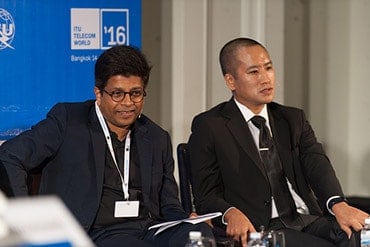
Will be talking about the digital economy in five or ten years, or will it simply be “the economy”? queried Natasha Beschorner, Senior ICT Policy Specialist, The World Bank. After all, “digital technologies are so integrated into all the different layers of society and economy that the term will be superfluous.”
Mainstreaming of digital technologies and disruptive trends such as artificial intelligence, neural networks, block chain technologies and robotization are happening much faster than we can anticipate. It is important, however, for governments to build awareness and share experiences in order to establish trust in the digital ecosystem.
But there are also billions, at the other end of the access scale, who are as yet unconnected. For Beschorner, it is important to leave market development to the private sector, supported by government taking a proactive, facilitating role, in particular with regard to taxation and regulations. Only in clear cases of market failure, such as remote, rural areas in developing countries, should international development funding step in.
In many of the new vertical sectors opened up by the digital economy, such as e government services, financial information systems and transport, money alone is often not the answer: knowledge partnerships with growing local industry may function better.
Taking up the theme of transforming society through digital technology, John Galvin, VP and General Manager of Government and Education, Intel, argued passionately for the need to upgrade education, to reboot in line with industry 4.0.
“Transformation in education is where it all starts, how do we better prepare students to go into industry and become an active part of transforming the economy?” he said, calling for content, methods and delivery of education itself to be revolutionized, to focus on future skills in the digital economy.
“How do we prepare students for this new economy, when we can’t really even predict the jobs that are going to be available to them?” he asked, reminding the panel that many of the jobs that exist today will not exist then – and will call for new skill sets. Taking action, preparing now is urgent, as “It’s no longer about the transformation that’s going to take place. It’s about what’s happening right now. And we see it accelerating.”
Fundamental to the transformation is its supporting infrastructure. The volume of machines and devices connected to the cloud will continue to expand rapidly, bringing many more data centres into the physical world – and issues of privacy and security on an unprecedented scale in to the ethical, legal and regulatory domains.
Learning how to use, access and control data will be important, particularly as machine learning and artificial intelligence ramp up and industry 4.0 becomes a reality. and security.
Big data and analytics are a big challenge for implementing industry 4.0 in emerging markets, according to Dr Atip Asvanund, Secretary-General, of the Telecommunications Association of Thailand – because of the very lack of data. “We need data for industry 4.0 so we can tailor products to meet customer needs,” he pointed out, but many people in Thailand, for example, do not access, use or create that data beyond social networks, where the data is held outside of the local geography and beyond its legal authority.
The second gap or mismatch between current local reality and the potential of industry 4.0 is the situation of the large number of individual farmers in Thailand, who do not have the economic or educational capital, nor perhaps the interest, to engage with or benefit from the digital economy. A whole generation risks being left behind.
As Pairoj Waiwanijchakij, Country Manager, Thailand, Myanmar, and Laos, Sterite-Elitecore Technologies pointed out, we have never known what the next part of life will bring; life is continually changing. The current pace of change through technology, however, is what is creating concern or even fear. Smart cities, e commerce, robot-run logistic services, connected cars, the sharing economy – there is no area of life that will not be transformed by industry 4.0.
For Saj Kumar, Vice President – Digital Transformation & IoT, SAP Asia Pvt. Ltd, one of the challenges of industry 4.0 is tying together “the physical manufacturing environment, the shop for the machines and the cyber or the information technology, to drive transformation in industry.”
Moderator
- Mr Pitjapol Jantanasaro, Principal Expert, National Broadcasting and Telecommunications Commission (NBTC), Thailand
Opening Remark
- Mr Houlin Zhao, Secretary General, International Telecommunication Union, Switzerland
Panellists
- Dr Atip Asvanund, Secretary-General, The Telecommunications Association of Thailand under the Royal Patronage, Thailand
- Ms Natasha Beschorner, Senior ICT Policy Specialist, The World Bank, Singapore
- Mr John Galvin, Vice President, Government and Education, Intel Corporation, USA
- Mr Saj Kumar, Vice President – Digital Transformation & IoT, SAP Asia Pvt. Ltd., Singapore
- Mr Pairoj Waiwanijchakij, Country Manager, Thailand, Myanmar, and Laos, Sterite-Elitecore Technologies Pvt. Ltd., Thailand
